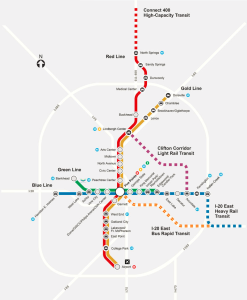MARTA Pushes Eight Billion Dollar Expansion, Half Penny Sales Tax
 (APN) ATLANTA — The Metropolitan Atlanta Rapid Transit Authority (MARTA) is now pushing for a package of rail line expansions, including the north line, the east line, and a new Clifton Corridor line, that would cost an estimated eight billion dollars and that would be funded in part by a half penny sales tax in Fulton, DeKalb, and Clayton Counties.
(APN) ATLANTA — The Metropolitan Atlanta Rapid Transit Authority (MARTA) is now pushing for a package of rail line expansions, including the north line, the east line, and a new Clifton Corridor line, that would cost an estimated eight billion dollars and that would be funded in part by a half penny sales tax in Fulton, DeKalb, and Clayton Counties.
MARTA may have lost out earlier this year when the General Assembly passed a one billion dollar transportation spending package that allocated hardly anything to public transit, but that is not stopping the transit authority from trying to ramp up its game.
MARTA’s latest proposal includes extending a northbound line all the way to Alpharetta, a possibility MARTA has been exploring since at least fall of 2014, as reported by Atlanta Progressive News. .
http://atlantaprogressivenews.com/2014/10/16/marta-eyes-expansion-into-north-fulton-county/
The plan also involves extending MARTA’s east-west line further into South DeKalb, along I-20.
And MARTA would construct a new light rail line between Avondale Estates and Lindbergh Center, via the Emory area – the so-called Clifton Corridor.
For decades, residents of Atlanta’s northern suburbs had long resisted MARTA expansion into their neighborhoods, objections which were often grounded in race and class divisions.
But Saba Long, a spokesperson for MARTA, says the agency has developed more clout and increased its appeal over the past three years.
“With three consecutive years of balanced budgets as well as increases in ridership and service, the agency is in a much stronger position,” Long told APN.
But MARTA still has a long way to go before the plan can become reality.
HB 170, the omnibus transportation package that the State Legislature passed at the end of this year’s Session, made it possible for local governments to hold penny sales tax referendums to fund local transit projects.
http://atlantaprogressivenews.com/2015/04/11/georgia-transportation-bill-ignores-public-transit/
But the law doesn’t allow for them to designate the revenue to MARTA, and the taxes can only be levied for five years.
MARTA is lobbying the legislature to raise the cap to 42 years and allow a half penny to go to directly to the agency.
MARTA is also talking with County officials in Fulton, DeKalb, and Clayton to gain their support for the sales referendum, pending the State’s approval.
If both of those things pan out, the decision will be in voters’ hands.
If voters agree to the tax, MARTA will have about half of the money it needs. The expansion will then depend on construction bonds and federal dollars to make up the remainder.
“MARTA is optimistic state lawmakers will allow the agency to pursue this funding mechanism,” Long said.
MARTA has gained more bipartisan support in the Legislature as businesses are increasingly catering to young professionals who, according to popular consensus, reject car culture and embrace “walkability.”
“MARTA was a critical part of the pitch to Mercedes Benz,” Long said, referring to the fact that, earlier this year, Georgia officials succeeded in luring the luxury car manufacturer to relocate its headquarters to Atlanta.
Indeed, MARTA Board Chairman Robbie Ashe has emphasized the economic development potential of the proposed expansion in several recent interviews with other news media.
But with the agency focusing on upwardly mobile millennials, are Atlanta’s working class and poor transit riders being lost in the discussion?
Long responded that everyone benefits from better MARTA service, and pointed out that MARTA has plans in the works for mixed-income developments at several stations.
“Something we are deliberate about is promoting affordable housing. We encourage developers to make twenty percent of the units affordable. It’s a very clear ask, but we can’t dictate,” she said.
Ashe has also pointed to MARTA’s balanced budget as a reason to support the plan.
Unfortunately the budget has been balanced, to some degree, on the backs of its workers, as APN has previously reported:
Still, the expansion plan offers hope that Atlanta may one day catch up with other major Metropolitan Areas throughout the U.S., and have an extensive public transportation system that is multi-modal.
MARTA’s plan would bring to fruition a substantial part of the extensive transit map visualized by Citizens for Progressive Transit (CPT).
http://www.cfpt.org/documents/worldclass_map.pdf
For that reason, it has the support of CPT president Lee Biola.
“The Legislature should let voters decide on this. Let voters decide on quality public transportation plans. We saw how well that went in Clayton County,” he said, referring to the County’s recent vote to join MARTA.
There has even been talk of extending MARTA to Gwinnett County as well.
http://atlantaprogressivenews.com/2015/04/23/poll-shows-support-for-marta-in-gwinnett/
(END/2015)
What about the citizens of Clayton County. Will be get rail service as well. I hope so, because we wanted MARTA for better transportation to not only get around Atlanta but also Clayton County. We need service in just one part of Calyton County but the entire county that is why we voted to bring MARTA to Clayton County.